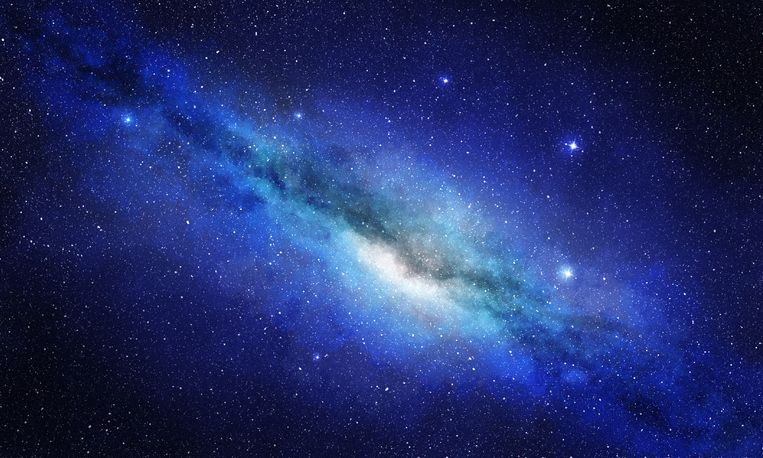Scientists baffled by discovery of 'weird galaxy' where dark matter doesn't exist


A free daily email with the biggest news stories of the day – and the best features from TheWeek.com
You are now subscribed
Your newsletter sign-up was successful
Here is a cosmic head-scratcher if there ever was one: Dark matter — an invisible, fundamental part of the universe — is supposed to be everywhere, with researchers "observing" its unobservable existence by following how the particles influence the movement of light or celestial bodies such as stars. Now scientists have found something that no one even knew was possible, The Associated Press writes: a galaxy with no dark matter at all.
Yale University astronomer Pieter van Dokkum stumbled upon the ancient galaxy, which is "as big as the Milky Way but with only 1 percent of its stars," AP writes. When he and his team went to measure the speed of star clusters in the galaxy, which should have been moving about 67,000 miles per hour, they found the clusters were moving a sluggish 18,000 miles per hour instead. That would only make sense if there was no dark matter at all acting on them — a finding confirmed when the researchers subsequently calculated the mass of the galaxy.
"It's sort of non-negotiable," said van Dokkum of the baffling conclusion, which is being taken seriously by other scientists working in the field. "There's nothing else, just the stars."
The Week
Escape your echo chamber. Get the facts behind the news, plus analysis from multiple perspectives.

Sign up for The Week's Free Newsletters
From our morning news briefing to a weekly Good News Newsletter, get the best of The Week delivered directly to your inbox.
From our morning news briefing to a weekly Good News Newsletter, get the best of The Week delivered directly to your inbox.
Case Western Reserve astronomer Stacy McGaugh confirmed that the findings make no sense, but, well, there they are anyway. "Not sure what to make of it, but it is definitely intriguing," she said. "This is a weird galaxy."
Curiously, the lack of dark matter in the galaxy (which has the prosaic name "NGC1052-DF2") could actually help scientists better prove dark matter's existence. Learn how at The Associated Press, and read everything you need to know about dark matter here at The Week.
A free daily email with the biggest news stories of the day – and the best features from TheWeek.com
Jeva Lange was the executive editor at TheWeek.com. She formerly served as The Week's deputy editor and culture critic. She is also a contributor to Screen Slate, and her writing has appeared in The New York Daily News, The Awl, Vice, and Gothamist, among other publications. Jeva lives in New York City. Follow her on Twitter.
-
 Political cartoons for February 14
Political cartoons for February 14Cartoons Saturday's political cartoons include a Valentine's grift, Hillary on the hook, and more
-
 Tourangelle-style pork with prunes recipe
Tourangelle-style pork with prunes recipeThe Week Recommends This traditional, rustic dish is a French classic
-
 The Epstein files: glimpses of a deeply disturbing world
The Epstein files: glimpses of a deeply disturbing worldIn the Spotlight Trove of released documents paint a picture of depravity and privilege in which men hold the cards, and women are powerless or peripheral
-
 Blue Origin launches Mars probes in NASA debut
Blue Origin launches Mars probes in NASA debutSpeed Read The New Glenn rocket is carrying small twin spacecraft toward Mars as part of NASA’s Escapade mission
-
 Dinosaurs were thriving before asteroid, study finds
Dinosaurs were thriving before asteroid, study findsSpeed Read The dinosaurs would not have gone extinct if not for the asteroid
-
 SpaceX breaks Starship losing streak in 10th test
SpaceX breaks Starship losing streak in 10th testspeed read The Starship rocket's test flight was largely successful, deploying eight dummy satellites during its hour in space
-
 Rabbits with 'horns' sighted across Colorado
Rabbits with 'horns' sighted across Coloradospeed read These creatures are infected with the 'mostly harmless' Shope papilloma virus
-
 Lithium shows promise in Alzheimer's study
Lithium shows promise in Alzheimer's studySpeed Read Potential new treatments could use small amounts of the common metal
-
 Scientists discover cause of massive sea star die-off
Scientists discover cause of massive sea star die-offSpeed Read A bacteria related to cholera has been found responsible for the deaths of more than 5 billion sea stars
-
 'Thriving' ecosystem found 30,000 feet undersea
'Thriving' ecosystem found 30,000 feet underseaSpeed Read Researchers discovered communities of creatures living in frigid, pitch-black waters under high pressure
-
 New York plans first nuclear plant in 36 years
New York plans first nuclear plant in 36 yearsSpeed Read The plant, to be constructed somewhere in upstate New York, will produce enough energy to power a million homes
